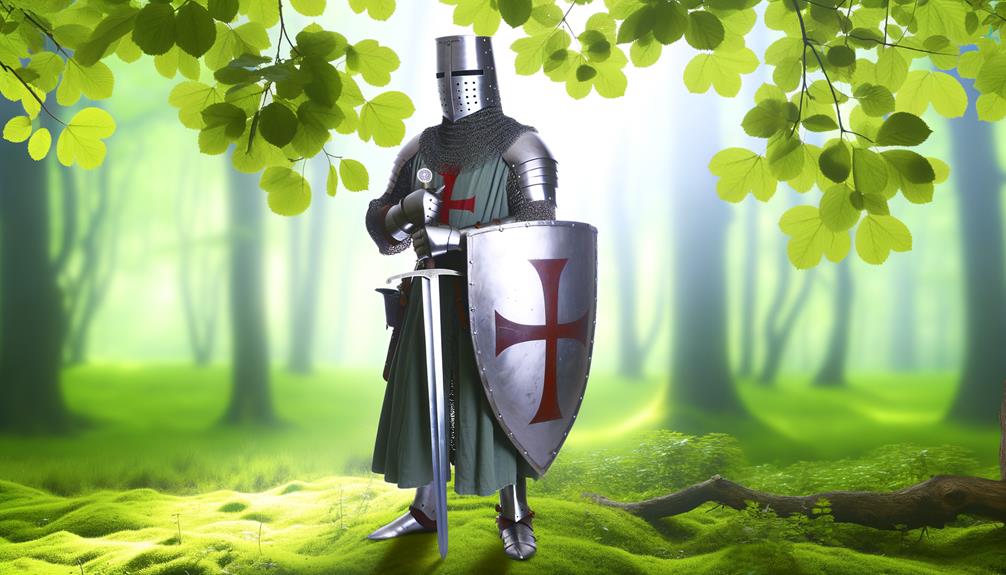Meaning of the Name Gonzalo
The name Gonzalo traces back to the Visigothic roots, originating from the Germanic elements "gunn" (war) and "salv" (safe or protected). This etymology emphasizes martial valor and guardianship.
Historically, Gonzalo has been associated with nobility and leadership, prominently during the Reconquista in medieval Spain. The name embodies qualities of bravery, protection, and strategic prowess, carrying a legacy through influential figures like Gonzalo de Berceo.
In contemporary times, it is celebrated within Hispanic communities and adopted globally. To uncover the full historic and cultural significance of the name Gonzalo, there is much more to explore.

Key Takeaways
- The name Gonzalo has Visigothic roots and derives from Germanic elements.
- It symbolizes protection, valor, and martial prowess.
- Historically, it is associated with nobility and leadership.
- The name reflects bravery and guardianship in medieval Spanish culture.
- Modern usage signifies cultural heritage and tradition in Hispanic communities.
Origin of the Name
The name Gonzalo, frequently traced back to its Visigothic roots, derives from the Germanic elements 'gunþ' meaning 'battle' and 'salv' meaning 'safe.' This etymological composition underscores a legacy of martial prowess tempered by a notion of protection.
The Visigoths, a Germanic tribe settled in Iberia during the early Middle Ages, influenced the linguistic landscape of the region to a great extent. Consequently, names like Gonzalo reflect this historical confluence of cultures.
Over centuries, the name evolved phonetically, adapting to the phonological systems of the Romance languages that supplanted Gothic. This linguistic evolution underscores the dynamic nature of language, where shifts in pronunciation and spelling often accompany broader socio-political changes, embedding layers of history within a single name.
Historical Significance
Gonzalo's historical significance is deeply intertwined with its frequent association with nobility and leadership roles throughout medieval Iberian society. Originating from the Gothic name Gundisalvus, which combines 'gund' (war) and 'salv' (safe), the name Gonzalo was borne by many influential figures during the Reconquista.
This period saw Christian kingdoms reclaiming territories from Muslim rule, and individuals named Gonzalo often held pivotal military and administrative positions. The name's etymological roots suggest a protector in war, aligning with the valor and strategic acumen required of leaders at that time.
Linguistically, the name evolved through Old Spanish, reflecting the phonetic shifts that characterized the Iberian Peninsula's languages. Gonzalo, hence, not only signifies personal valor but also embodies the historical essence of medieval leadership.
Cultural Roots
Cultural roots of the name Gonzalo trace back to the amalgamation of Visigothic and Iberian traditions, reflecting a rich tapestry of historical and linguistic evolution. Originating from the Gothic name Gundisalv, it was introduced to the Iberian Peninsula during the Visigothic rule. The name Gonzalo has undergone transformations through the centuries, adapting to the phonetic and linguistic nuances of the region.
| Element | Visigothic Influence | Iberian Adaptation |
|---|---|---|
| Primary Origin | Gundisalv | Gonzalo |
| Language Family | Germanic | Romance |
| Historical Period | 5th-8th Century | 9th-15th Century |
| Cultural Impact | Warrior heritage | Noble and literary use |
This intricate blend of influences underscores the name's enduring legacy within Spanish culture.
Meaning and Symbolism
The name Gonzalo finds its etymological roots in the Visigothic language, derived from the elements 'gunþ' meaning 'battle' and 'salv' meaning 'safe.'
Historically, this name has been imbued with connotations of protection and valor, reflecting its prominence in medieval Spanish culture.
Its symbolic resonance endures today, often invoking notions of bravery and guardianship.
Etymology and Origins
Derived from the Old High German name Gundisalv, Gonzalo's etymology reveals a compound structure combining 'gund,' meaning 'battle,' and 'salv,' meaning 'safe' or 'saved.'
This name gradually transformed through linguistic evolution as it traversed different regions and historical periods. The Visigoths, who ruled parts of the Iberian Peninsula, were instrumental in adapting Gundisalv to the medieval Spanish form Gonzalo.
This transformation underscores the fluidity of language and cultural exchange during the early Middle Ages. The name's martial connotations, rooted in the notion of being 'safe in battle,' resonated particularly well in an era when personal valor and protection were paramount.
Gonzalo embodies a rich tapestry of linguistic and historical significance, reflecting its enduring legacy.
Cultural Significance
Reflecting its historical roots and etymological richness, the name Gonzalo has evolved to symbolize bravery, protection, and resilience in various cultural contexts.
Originating from the Visigothic name Gundisalv, composed of 'gund' meaning 'war' and 'salv' denoting 'safe' or 'protected,' Gonzalo carries connotations of a valiant protector.
In medieval Spain, the name was often attributed to knights and warriors, embedding a legacy of courage and steadfastness. Linguistically, it resonates with themes of guardianship and fortitude, reflecting the societal values of its bearers.
Over time, Gonzalo has maintained its symbolic significance, embodying qualities admired across generations and cultures, making it a name that continues to inspire respect and admiration in those who encounter it.
Famous Namesakes
Numerous individuals bearing the name Gonzalo have left a significant mark on history and culture. The name, rooted in the Visigothic traditions of Spain, carries connotations of battle and nobility, as seen through its etymological components "gund" (battle) and "salv" (safe). It has been borne by notable figures across various fields, illustrating its enduring legacy.
| Name | Field | Contribution |
|---|---|---|
| Gonzalo Jiménez de Quesada | Exploration | Conquistador who founded Bogotá |
| Gonzalo Torrente Ballester | Literature | Renowned Spanish novelist and essayist |
| Gonzalo Rubalcaba | Music | Grammy-winning Cuban jazz pianist |
| Gonzalo Higuaín | Sports | Internationally acclaimed Argentine footballer |
| Gonzalo de Berceo | Poetry | First known Castilian poet |
Such namesakes highlight the broad cultural and historical impact of individuals named Gonzalo.
Popularity Over Time
The name Gonzalo has experienced fluctuating levels of popularity throughout history, often influenced by socio-political events and cultural trends.
Originating from the Visigothic name Gundisalv, which means 'battle-ready' or 'warrior,' Gonzalo gained traction during medieval Spain.
Its popularity surged in the Renaissance due to the influence of literature and noble lineage, evidenced by figures such as Gonzalo Fernández de Córdoba, a celebrated military leader.
The name's prominence waned during periods of political upheaval but saw revitalization through cultural productions like plays and novels.
Contemporary usage of Gonzalo has stabilized, reflecting a blend of historical reverence and modern appeal, while regional variations continue to impact its prevalence in various Spanish-speaking countries.
Traits and Characteristics
The name Gonzalo, with its roots in the Gothic language, historically signifies qualities of leadership and strength, often associated with warrior-like prowess.
Linguistically, it also conveys a sense of creativity and intelligence, traits that are embedded in the name's evolution through various cultures.
This duality of meaning reflects the multifaceted characteristics attributed to individuals bearing this name.
Leadership and Strength
Rooted in its etymological origins, the name Gonzalo embodies a historical legacy of leadership and strength, tracing back to its Visigothic roots. The name is derived from the Old High German words 'gund,' meaning 'war,' and 'salv,' meaning 'safe.' This linguistic fusion underscores a persona marked by resilience and valor.
Throughout history, bearers of the name Gonzalo have often been noted for their commanding presence and strategic acumen.
Key characteristics of the name Gonzalo include:
- Leadership: A natural ability to guide and influence others.
- Strength: Both physical and moral fortitude.
- Courage: Willingness to face challenges head-on.
- Nobility: A sense of honor and ethical conduct.
These traits collectively highlight why the name Gonzalo continues to resonate as a symbol of robust leadership.
Creativity and Intelligence
Examining the name Gonzalo through a historical and linguistic lens, one discovers a rich tapestry of creativity and intelligence intertwined with its legacy. Originating from the Visigothic name Gundisalv, meaning "battle genius," Gonzalo has evolved to symbolize intellectual prowess and imaginative capability. This name has been borne by numerous influential figures, reinforcing its association with creative and intelligent traits.
| Trait | Historical Context | Linguistic Analysis |
|---|---|---|
| Creativity | Artistic contributions | "Gund" (battle) |
| Intelligence | Scholarly achievements | "Salv" (safe, whole) |
| Innovation | Inventions and discoveries | Compound structure |
| Wisdom | Philosophical insights | Evolved meanings |
| Strategy | Military tactics | Root word adaptations |
These attributes collectively paint Gonzalo as a name that embodies a harmonious blend of creativity and intellect.
Modern Usage
In contemporary settings, the name Gonzalo continues to be a significant cultural marker, reflecting both its historical roots and modern linguistic evolution. This name, derived from the Visigothic term 'Gundisalvus,' showcases a rich tapestry of historical and linguistic transformations.
In modern times, Gonzalo is prevalent in Spanish-speaking countries and carries connotations of nobility and leadership. To appreciate its modern usage, consider the following:
- Cultural Resurgence: Gonzalo remains popular in Hispanic communities, symbolizing heritage and tradition.
- Literary Presence: The name is frequently found in contemporary Spanish literature, underscoring its enduring appeal.
- Celebrity Influence: Prominent figures named Gonzalo contribute to its contemporary relevance.
- Global Adaptation: Variants like 'Gonçalo' in Portuguese-speaking regions illustrate its widespread influence.
Understanding these facets enriches our comprehension of Gonzalo's modern significance.
Conclusion
In the grand tapestry of names, Gonzalo stands as a beacon of valor and wisdom, its threads woven from Visigothic roots and medieval Spanish heritage.
The name encapsulates traits of leadership and nobility, symbolizing a legacy that resonates through centuries.
Like a timeless manuscript, Gonzalo's enduring popularity and cultural significance continue to illuminate the pathways of history, offering a glimpse into a past rich with meaning and a future ripe with potential.






